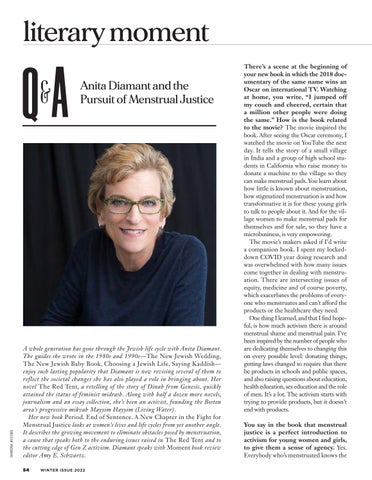literary moment
QA
SHARONA JACCOBS
&
Anita Diamant and the Pursuit of Menstrual Justice
A whole generation has gone through the Jewish life cycle with Anita Diamant. The guides she wrote in the 1980s and 1990s—The New Jewish Wedding, The New Jewish Baby Book, Choosing a Jewish Life, Saying Kaddish— enjoy such lasting popularity that Diamant is now revising several of them to reflect the societal changes she has also played a role in bringing about. Her novel The Red Tent, a retelling of the story of Dinah from Genesis, quickly attained the status of feminist midrash. Along with half a dozen more novels, journalism and an essay collection, she’s been an activist, founding the Boston area’s progressive mikvah Mayyim Hayyim (Living Water). Her new book Period. End of Sentence. A New Chapter in the Fight for Menstrual Justice looks at women’s lives and life cycles from yet another angle. It describes the growing movement to eliminate obstacles posed by menstruation, a cause that speaks both to the enduring issues raised in The Red Tent and to the cutting edge of Gen Z activism. Diamant speaks with Moment book review editor Amy E. Schwartz. 54
WINTER ISSUE 2022
There’s a scene at the beginning of your new book in which the 2018 documentary of the same name wins an Oscar on international TV. Watching at home, you write, “I jumped off my couch and cheered, certain that a million other people were doing the same.” How is the book related to the movie? The movie inspired the book. After seeing the Oscar ceremony, I watched the movie on YouTube the next day. It tells the story of a small village in India and a group of high school students in California who raise money to donate a machine to the village so they can make menstrual pads. You learn about how little is known about menstruation, how stigmatized menstruation is and how transformative it is for these young girls to talk to people about it. And for the village women to make menstrual pads for themselves and for sale, so they have a microbusiness, is very empowering. The movie’s makers asked if I’d write a companion book. I spent my lockeddown COVID year doing research and was overwhelmed with how many issues come together in dealing with menstruation. There are intersecting issues of equity, medicine and of course poverty, which exacerbates the problems of everyone who menstruates and can’t afford the products or the healthcare they need. One thing I learned, and that I find hopeful, is how much activism there is around menstrual shame and menstrual pain. I’ve been inspired by the number of people who are dedicating themselves to changing this on every possible level: donating things, getting laws changed to require that there be products in schools and public spaces, and also raising questions about education, health education, sex education and the role of men. It’s a lot. The activism starts with trying to provide products, but it doesn’t end with products. You say in the book that menstrual justice is a perfect introduction to activism for young women and girls, to give them a sense of agency. Yes. Everybody who’s menstruated knows the











